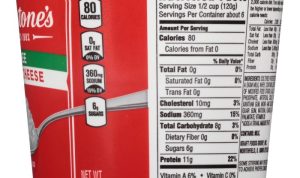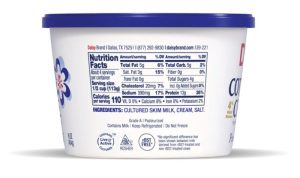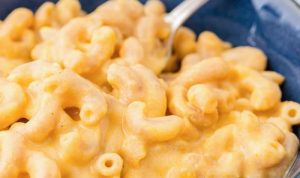Sodium and Cholesterol Levels
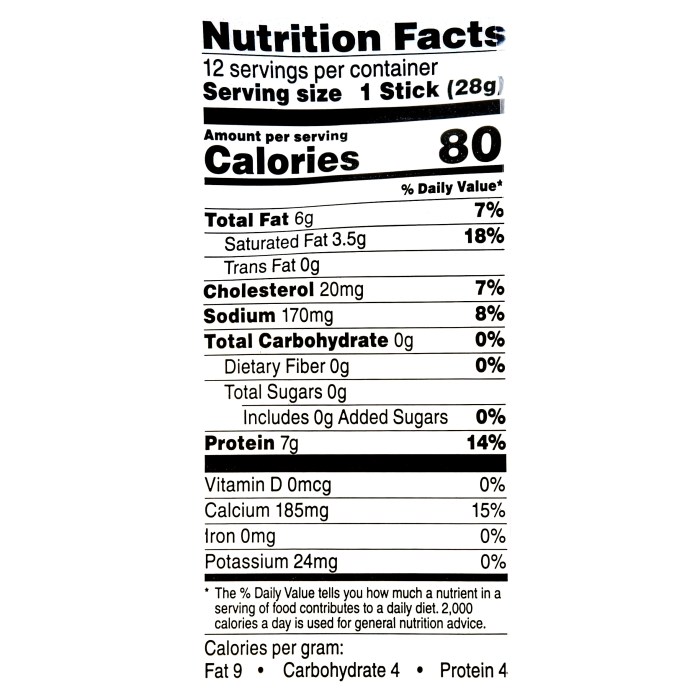
Mozzarella string cheese nutrition facts – Let’s talk about the salty, cheesy elephant in the room: the sodium and cholesterol content of your beloved mozzarella string cheese. While undeniably delicious, this dairy delight isn’t exactly a health halo food. We’ll delve into the specifics, because knowledge is power (and power helps you make informed snacking choices!).A typical serving of mozzarella string cheese (around 1 ounce) packs a surprisingly hefty punch of sodium – often around 150-200 milligrams.
That’s a significant chunk of your daily recommended intake, especially if you’re already a salt-loving fiend. High sodium intake can contribute to high blood pressure, increasing your risk of heart disease and stroke. Think of your arteries as tiny, delicate roads; too much sodium can clog them up, leading to traffic jams (and not the fun kind).
Sodium Content and Health Effects, Mozzarella string cheese nutrition facts
Excessive sodium consumption can lead to water retention, bloating, and even more serious health issues like hypertension. While an occasional string cheese won’t send you straight to the hospital, consistently high sodium intake is a recipe for disaster. Imagine a tiny, salty gremlin living in your arteries, happily clogging things up. That’s not a fun image, is it?
Moderation, my friends, is key.
Cholesterol Levels and Heart Health
Mozzarella string cheese also contains cholesterol, though the amount varies depending on the brand and production method. Cholesterol is a fatty substance found in your blood, and high levels can contribute to the formation of plaque in your arteries – those same tiny roads we mentioned earlier. While your body produces cholesterol naturally, consuming too much cholesterol from dietary sources can exacerbate the problem.
So you’re looking at mozzarella string cheese nutrition facts? Those little stretchy delights are surprisingly caloric, but hey, at least they’re fun to eat! Want a slightly different cheesy experience? Check out the nutritional info for cheese stick nutrition colby jack – it’s a whole different ball game of flavor and probably a different calorie count too.
Back to mozzarella: remember portion control, my friend, portion control!
It’s a bit like adding extra cars to an already congested highway system.
Strategies for Reducing Sodium Intake
It’s not all doom and gloom, though! Here are a few strategies to help you enjoy your string cheese without feeling guilty (or experiencing a sodium-induced heart attack):
- Choose lower-sodium options: Many brands now offer reduced-sodium versions of mozzarella string cheese. Look for these on the supermarket shelves; your heart will thank you.
- Portion control: Instead of demolishing a whole pack in one sitting, try limiting yourself to one or two sticks at a time. This is especially important if you have a pre-existing condition.
- Balance your diet: Pair your string cheese with plenty of fruits, vegetables, and whole grains. This helps to balance out the sodium and overall nutrient profile of your meal.
- Read food labels carefully: Become a label-reading ninja! Pay close attention to the sodium content listed on the nutrition facts panel.
- Consider homemade options: If you’re feeling adventurous (and have a bit of time on your hands), try making your own mozzarella string cheese. This gives you complete control over the ingredients and sodium levels.
Comparison with Other Snack Options
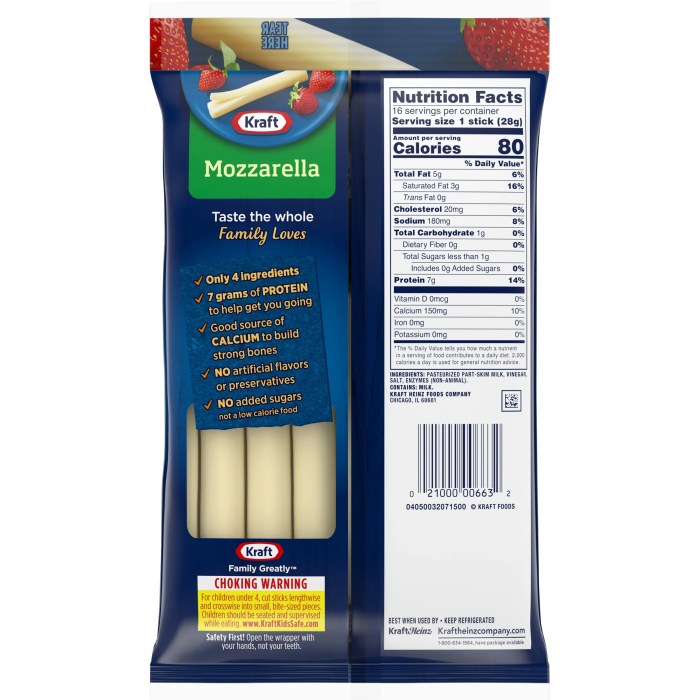
Let’s face it, the snack aisle is a battlefield. A glorious, cheesy, sometimes-nutty battlefield. Mozzarella string cheese bravely stands its ground, but how does it stack up against the competition? We’ll delve into the nutritional smackdown between our stringy hero and some other popular snack contenders. Prepare for a delicious data dive!Mozzarella string cheese, while undeniably delicious (and fun to eat!), isn’t the only game in town when it comes to satisfying those between-meal munchies.
Yogurt, nuts, and fruit all offer unique nutritional profiles, making the choice of the “best” snack a matter of personal preference and dietary needs. Let’s examine the pros and cons of each, comparing them to our cheesy champion.
Nutritional Comparison of Snacks
The following table provides a comparative analysis of the nutritional profile and health benefits of mozzarella string cheese versus three common snack alternatives: plain nonfat Greek yogurt, a handful of almonds (about 23), and a medium-sized apple. Remember, these are approximate values and can vary depending on brand and serving size. It’s always best to check the nutrition label for the most accurate information.
Don’t be a label-ignoring rebel!
| Snack | Calories (approx.) | Protein (approx.) | Fat (approx.) | Fiber (approx.) | Health Benefits |
|---|---|---|---|---|---|
| Mozzarella String Cheese (1 stick) | 80-100 | 7-8g | 6-8g | 0g | Good source of calcium and protein; portable and convenient. |
| Plain Nonfat Greek Yogurt (1 cup) | 130-150 | 20-25g | 0-2g | 0g | High in protein, good source of calcium and probiotics; promotes gut health. |
| Almonds (1/4 cup, about 23) | 160-200 | 6g | 14g | 3.5g | Good source of healthy fats, fiber, and vitamin E; provides sustained energy. |
| Medium Apple | 95 | 0g | 0g | 4g | High in fiber, vitamins, and antioxidants; aids digestion and promotes satiety. |
FAQ Guide: Mozzarella String Cheese Nutrition Facts
Is mozzarella string cheese a good source of calcium?
Yes, mozzarella string cheese is a good source of calcium, an essential mineral for strong bones and teeth.
Can I eat mozzarella string cheese if I’m lactose intolerant?
Lactose intolerance varies in severity. Some individuals with mild lactose intolerance may tolerate small amounts, while others may experience digestive discomfort. Lactose-free alternatives exist, but it’s best to consult your doctor or a registered dietitian.
How does mozzarella string cheese compare to other protein sources?
Mozzarella string cheese offers a moderate amount of protein compared to other sources like lean meats, poultry, or beans. However, it’s a convenient and easily accessible protein option for a snack.
Is mozzarella string cheese suitable for a ketogenic diet?
It can be part of a ketogenic diet, depending on your daily macronutrient goals. The low carbohydrate content makes it a viable option, but portion control is essential.


